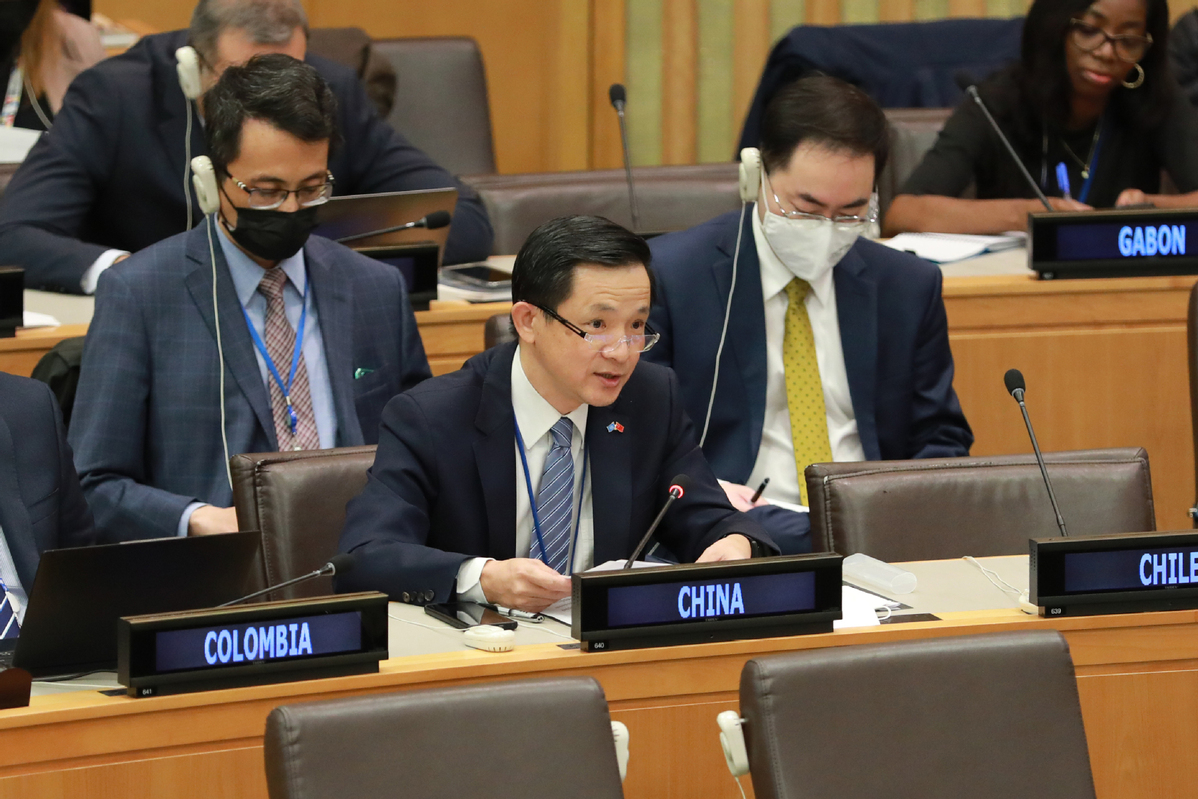Human rights' politicization denounced
By MINLU ZHANG at the United Nations | chinadaily.com.cn | Updated: 2022-10-21 07:15

A Chinese envoy on Wednesday said there's no need for condescending remarks or human rights' politicization. His statement was agreed upon by developing countries.
"Respecting and protecting human rights is the unremitting pursuit of the Communist Party of China, the Chinese government, and the Chinese people," Dai Bing, charge d'affaires at the Chinese Permanent Mission to the United Nations, said at the Third Committee of the UN General Assembly.
"We uphold the people-centered human rights concept and are committed to making people's happy life the greatest human right. Especially in the past 10 years, China's human rights cause has achieved historic leaps and development, and has made positive contributions to the advancement of the world's human rights cause," he said.
Dai also said the Third Committee is a platform for dialogue and cooperation, adding that the world needs fairness and justice and that there is "no need for a ‘teacher' to boss around other countries".
A few countries have "abused the platform of the Third Committee, insisting on provoking confrontation, deliberately politicized and instrumentalized human rights issues, and interfered in the internal affairs of other countries," said Dai, adding that such attempts will not succeed.
"Some countries always boss around the human rights situation in developing countries, but they never look at their own and their allies' misdeeds on human rights issues," said Dai. He said this showed their "hypocrisy and double standards".
Dai on Wednesday also made a statement at the Third Committee meeting, calling for the immediate lifting of unilateral coercive measures.
Dai said developing countries continue to fall victim to unilateral coercive measures, which run counter to the purposes and principles of the UN Charter and international law, multilateralism, and international relations.
"We reaffirm our opposition to unilateral coercive measures and call on imposing states to immediately and completely cease such practice. We call on states to avoid imposing future unilateral sanctions not in accordance with international law and the Charter of the United Nations. The current circumstance calls for solidarity and unity rather than confrontation and division, to address global challenges and promote and protect human rights for all," Dai said.
Zimbabwe agreed with the statements delivered by China stated the delegations support for the universality and the non-politicization of human rights, said Garikai Manyanga, a Third Committee Expert of Zimbabwe.
Zimbabwe believes in universality, impartiality, and non-selectivity and non-politicization in the promotion and protection of human rights, he said.
Some states' "holier than thou" attitudes are self-serving and counterproductive, he said, stressing that creating dialogue is the best way forward.
Country-specific reports and resolutions that only serve political agendas will not save people. No country has yet reached human rights protection's "final destination" and the global community should commit to helping each other. He warned the human rights bodies' credibility is at stake.
Venezuela, speaking on behalf of the Group of Friends in Defense of the Charter of the UN, an organization launched last year in UN that consists of 19 countries include China, noted increased unilateralism and divisionism, and rejected double standards in human rights.
The country expressed concern over the growing proliferation of mechanisms and procedures that conduct assessments of human rights in specific states and which, in most cases, lack their due consent and participation, relying on sources that may be either biased or non-credible, said Joaquín Pérez Ayestarán, the representative of Venezuela.
Belarus said it also aligned with China, the Group of Friends, and several countries, noted that every society has its own approach to freedom and social justice.
Singaporean Ambassador Burhan Gafoor said Singapore does not claim its model is perfect, and it is open to learning from others. However, it alone must decide what works best, given its unique circumstances.
"We do not try and impose our views on other societies, and most importantly, we do not try and export our model to other countries because we know that at the end of the day, each country must decide for itself what will work best for it in light of their own unique circumstances, taking into account their international law obligation," Gafoor said, calling on all member states to avoid the temptation to use the Third Committee as a platform to sermon.
He said countries should avoid making judgements based on the false belief that some cultures are superior to others. "There is no place for cultural arrogance or a sense of cultural superiority in this committee or at the United Nations."
























